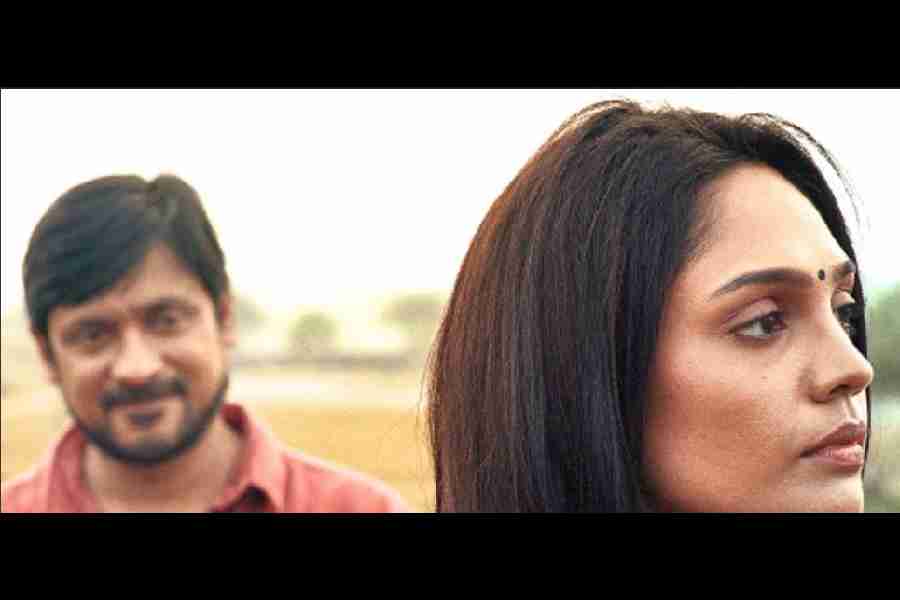Subrata Sen’s debut with Ek Je Ache Konya was a stunning departure from the scenario of Bangla cinema in 2001. His second was a letdown for me, but Nil Nirjone, India’s first digital film, was again a strong departure in style and content. In fact, he tackled rather taboo issues, with wit and the initial sound of Bangla rock. Having followed his works as a colleague and not always excited with all that he produced, I must say that Subrata is one of those hugely underrated Bengali film-makers, who is one of the pioneers of independent Bangla productions. His contribution, like mine, has been experimental, thereby inconsistent. Yet he never submitted to the bulk of middle-class Bengali, who pamper antiseptic cinema.
With Samaresh Basu’r Projapoti, adapted from the controversial novel by Samaresh Basu, Subrata is again back with a bang. I think this is his best till date. This rather grittily shot gangster romance is not devoid of flaws. Yet, it is a rather enduring watch for its crispness, bold humour, a narration that refuses to be sentimental in a scenario steeped in sentimentality. Samaresh Basu’r Projapoti works for me, purely because it is a truly adult experience after a long time, when any and everybody is hell-bent on pampering dated melodrama.
There are three key factors that make the film exciting. The first is the superbly sexy editing by Amir Biswas and Subrata himself. They ruthlessly cut back and forth from the three stages of the hero, Shukhen’s life. It automatically creates a dynamic collage of time and its politics that alienates the audience and makes one think more than feel. This time jump increases the tension of viewing and enhances the unpredictability of the politics of the story. The world where political power shifts are as arbitrary as sexual choices becomes crystal clear. You know from the very beginning Shukhen’s existential stance is futile.

The second attraction is the highly gritty cinematography of Basab Mullik which heightens the power of the subversive narrative. Shot in an equally gritty small town of Purulia, Basab’s consistency of handheld mid-shots captures the environment and not just the characters. The beauty of the shots lies in their almost adamant refusal to be conventionally pretty. All the night indoors are superbly real. That the action or chase sequences are not loaded with shots but attempt to capture the location instead, elevates the poetry of the gritty world of Shukhen. A rather subversive poetry. Despite the somewhat overthe-top performance, the single long shot of Shukhen accusing the Gods is highly engrossing. The sporadic digital zooming in and out adds to the unpredictability of the narration.
The third and most important factor is that Subrata Sen’s screenplay refuses to adhere to the highly long original text of Samaresh Basu. His apparently arbitrary choice of selecting key scenes from the original and transplanting them into a certain timeless period enhances the aimless futility of Shukhen’s violent life. The pitfall of screen adaptation of literature lies in the inability to find an original voice.
Sen manages to avoid it by finding his own version of the once-banned novel. He discards the most talked about sequence of the boy Shukhen tearing one of the wings of the butterfly. He edits out Shukhen losing one of his arms in a bomb blast. That he doesn’t care to show that Sukhen’s underworld bosses, Borda and Chorda as his brothers actually heightens the “dada” cult. Personally, I find this screen adaptation of Basu’s novel better than his previous Bibar.
Yet, I am certain that Shukhen’s childhood portion could have been shortened.
Apart from the parody of an item song, Dim Pauruti, which adds to the subaltern milieu of the heroine’s world, the background could have been far more raunchy and contrapuntal to the visual. I always had a hunch that Rwitobroto Mukherjee has cold fire while watching Open Tee Bioscope. Somehow typecast into the sweet, coming-of-age boy, he lost my attention. In Samaresh Basu’r Projapoti, he simply storms as the young Sukhen. His stunningly cold and effortless brutality is haunting. He almost carries the entire weight of the lead character on his own. Except for the rather inconsequential song sequence with his girlfriend, Rwitobroto is one actor in the film you wait for. The scene where he snarls like an animal while making out with his girl played by Sritama Day is one Anjan Dutt sequence that you want to revisit after it’s over.
Subrat Dutt, on the other hand, could have done better. Almost tailor-made for him, Dutt somehow fails to grasp the character’s dark soul. I say this with full faith in his ability and the fact that he too is criminally underrated in Bengal. Dutt should have not played into the melodrama inherent in the character. His sad eyes coupled with a pokerfaced hardboiled gait were good enough not to do anything at all. He slipped into too much effort in certain key scenes and the dangerous Shukhen slipped away. The one scene which works for me is his handing over the gun to his girlfriend. Here he manages to bring the cold ice in romance.
On the contrary Mumtaz Sorcar as Shikha is a surprise. She effortlessly slips into the cheap, suburban “macha” dancer without losing her angst. In every scene, the mundane subaltern world comes alive because of her abrasive nonchalance. Even in scenes where she dreams of a better life or breaks down and cries she refuses to be sentimental. Mumtaz brings out complexity in an otherwise simplistic character.

A moment from the film
That Subrata Sen casts many local, unknown actors, the subaltern reality of Basu’s novel is heightened. Those of you who are tired of the stereotype and want to enjoy something different, go for Samaresh Basu’r Projapoti as soon as possible before it loses its grip at the theatres. Your decision matters to those who are trying to make a difference to Bangla cinema. Instead of complaining, it’s you who can actually fill up the theatres and give momentum to that difference.
The climax has the sudden brutal futility Samaresh Basu’r Projapoti deserves. Again, it has a Subrata Sen signature ending that is quirky. Shukhen lies shot in the back. Dutt’s eyelids flutter, open then shuts slowly. You are not sure whether he is dead or is finally sleeping.










